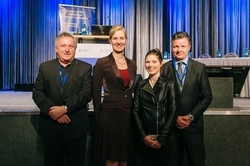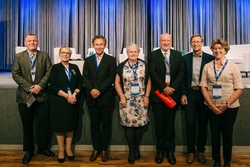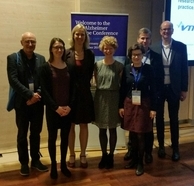Berlin, 4 October 2017 – The focus of the final day of the Alzheimer Europe Conference was on the diagnosis, treatment and prevention of dementia and on the important contributions of European research efforts to advancing these fields. Focus on prevention, timely diagnosis and innovative treatments  In his plenary presentation, Dr Horst Bickel from the Technical University of Munich (Germany) provided “An overview of current epidemiological trends in dementia”. He stressed that up to one third of dementia disorders could probably be prevented by controlling risk factors. The most promising in terms of prevention were a reduction of vascular risk factors (smoking, obesity and hypertension) and an increase in physical and mental activity. A number of studies suggested a secular trend towards a decline in dementia risk in Western countries. In his plenary presentation, Dr Horst Bickel from the Technical University of Munich (Germany) provided “An overview of current epidemiological trends in dementia”. He stressed that up to one third of dementia disorders could probably be prevented by controlling risk factors. The most promising in terms of prevention were a reduction of vascular risk factors (smoking, obesity and hypertension) and an increase in physical and mental activity. A number of studies suggested a secular trend towards a decline in dementia risk in Western countries.
“Reducing dementia risk by targeting modifiable risk factors in mid-life: the lessons of the In-MINDD project” was also the focus of the presentation by Prof. Kate Irving from Dublin City University (Ireland). In-MINDD sought to take the best available evidence and integrate this within a communication and support tool to help communicate reliable and important messages to the public and the health and social care community via a website designed with this purpose. Although the intervention did not demonstrate a significant change in behaviour in participants, lessons were learned concerning the process of normalising new complex interventions into existing care and the role of technology in supporting behaviour change to support cognitive health. Prof. Irving concluded by calling for a balance between investment in prevention, care and cure. Prof. Wiesje van der Flier from the VU Medical Centre in Amsterdam (Netherlands) focused on “Advances in Alzheimer’s diagnosis; implications for clinical practice?” Her positive assessment of the research over the past decades was that it had resulted in great progress in our knowledge of Alzheimer’s diagnosis. One of the challenges is how to combine the available information in a way that is both meaningful for the individual patient and doable for the individual doctor. According to Prof. van der Flier, there is room for shared decision making and improved communication between patients, carers and professional. E-tools may be of help for this purpose. The question “Are we getting closer to better treatments for Alzheimer’s disease?” was addressed by Prof. Frank Jessen from the University of Cologne (Germany). He highlighted the enormous challenge of developing a new treatment for Alzheimer’s disease, since, so far, all promising drugs for disease modification, but also new compounds for symptomatic treatment have failed to show clinical efficacy. Amongst the reasons for these failures, he cited difficulties with treatment targets, mode of action and selection of patients. Despite these negative results, a number of important learnings were gained: Very early treatment and combination therapies are the upcoming next steps. Importantly, recent studies also showed promising results in the field of non-pharmacological interventions with regard to prevention of dementia. In addition, there is development in the treatment of behavioural symptoms at the stage of dementia. Identifying current and future research priorities  A final round table brought together key stakeholders at a European level to discuss and identify current and future research priorities. Moderated by Sabine Jansen, the Executive Director of the German Alzheimer’s association, the panel included: A final round table brought together key stakeholders at a European level to discuss and identify current and future research priorities. Moderated by Sabine Jansen, the Executive Director of the German Alzheimer’s association, the panel included:
- Lutz Frölich (European Alzheimer’s Disease Consortium, Germany)
- Iva Holmerová (Alzheimer Europe, Czech Republic)
- Andreas Holtel (European Commission)
- Pierre Meulien (Innovative Medicines Initiative)
- Helen Rochford-Brennan (European Working Group of People with Dementia, Ireland)
- Winfried Teschauer (Deutsche Alzheimer Gesellschaft, Germany)
- Myrra Vernooij-Dassen (INTERDEM, Netherlands)
The participants highlighted the growing support for dementia research at both a national and European level, with a number of programmes including the Innovative Medicines Initiative (IMI), the Joint Programme for Neurodegenerative Diseases Research (JPND) and Horizon2020 programme dedicating significant funds to all aspects of dementia research. The need for a better coordination of these different programmes was discussed, as well as the importance of promoting a holistic approach to dementia research. Pierre Meulien presented the example of IMI which addresses all aspects of Alzheimer’s disease research, from knowledge creation to developing new treatments. Andreas Holtel from the European Commission emphasised that beyond H2020, research on Alzheimer's disease, dementia and neurodegenerative diseases in general will remain a prime focus, targeting the full breadth of research efforts from understanding the disease to implementation and public health research. 
According to Winfried Teschauer, strengthening research in nursing and care sciences would support primary and secondary care. For the European Alzheimer’s Disease Consortium, the development of sensitive and specific biomarkers for an early diagnosis of AD and other dementias, which can be used in general practice and the development of effective disease-modifying therapies for Alzheimer’s disease constitute priority areas for research. Social health is a priority for the INTERDEM network and its chairperson Myrra Vernooij-Dassen expanded: “Social health, including social engagement is underused in prevention and treatment of dementia. Research could focus on its working mechanisms and on developing, evaluating and implementing interventions to enhance social health.” Patient engagement and involvement in co-developing new strategies to combat Alzheimer’s disease was seen as critical to the success against the disease, according to Pierre Meulien, whilst Helen Rochford-Brennan said: “Every person with dementia has human rights, and should be entitled to receive information about research and, if willing, be enabled to take part in research on dementia. This gives us hope.” The quick translation of research results into clinical practice was another important recommendation from the discussions and was highlighted by Iva Holmerová and Lutz Frölich: “Scientific advances have to be evaluated with respect to their clinical relevance and applicability in the practice of medicine”. Echoing the motto of the conference, participants stressed the importance of “Care today, cure tomorrow” to ensure that we provide hope for the future for better treatment and prevention strategies, whilst recognising the need to improve the quality of life, support and care of people living with dementia today. Showcasing European projects Various research projects were also highlighted and presented in the course of the two-day conference. Alzheimer Europe is a proud partner in a number of these pan-European research collaborations and ensures the views of people with dementia and carers are duly integrated in the research, contributes to the discussion of ethical issues raised by the research and supports the dissemination and communication activities of research results to the wider dementia community and the general public.  Conference participants were greeted with a conference bag which included a special supplement of AE’s Dementia in Europe magazine which provided a high level overview of the PredictND project. An interactive and educational session was also dedicated to this project and allowed the researchers to present the results of the project focusing on the important role that information technology and the PredictND clinical decision support tool could play in improving the diagnosis of Alzheimer’s disease and other dementias in clinical practice. Conference participants were greeted with a conference bag which included a special supplement of AE’s Dementia in Europe magazine which provided a high level overview of the PredictND project. An interactive and educational session was also dedicated to this project and allowed the researchers to present the results of the project focusing on the important role that information technology and the PredictND clinical decision support tool could play in improving the diagnosis of Alzheimer’s disease and other dementias in clinical practice.
A special lunch-time symposium supported by Lilly engaged the audience to discuss the role of patient organisations in Alzheimer’s research in general and in three IMI-funded projects in particular: - MOPEAD (Models of Patient Engagement in Alzheimer’s Disease) presented by Dr Mercè Boada, aims to improve timely diagnosis through citizens’ participation.
- EPAD (European Prevention of Alzheimer’s Dementia) presented by Prof. Craig Ritchie is pioneering novel approaches to clinical trials in Alzheimer’s disease.
- ROADMAP (Real world outcomes across the Alzheimer’s disease spectrum for better care: multi-modal data access platform) presented by Dr Catherine Reed will use real world evidence to assess the value of new medicines.
Good bye Berlin, welcome Barcelona The three-day conference was formally closed by Iva Holmerová who thanked the 181 speakers and 216 poster presenters for their active contributions to the success of the conference and for sharing their research, projects and experiences. She also paid a special tribute to the various sponsors of the conference, including the health programme of the European Union as well as Abbvie, Alzheimer Europe Foundation, Axovant, Eisai, Lilly, MSD, Otto und Edith Mühlschlagel Stiftung in der Robert Bosch Stiftung, Roche and Visit Berlin. She invited all participants to already take note of the date of the next Alzheimer Europe Conference “Making dementia a European priority” in Barcelona from 29 to 31 October 2018. For further information, contact: Jean Georges, Executive Director of Alzheimer Europe, 14, rue Dicks, L-1417 Luxembourg, Tel.: +352-29 79 70, Fax: +352-29 79 72, jean.georges@alzheimer-europe.org |